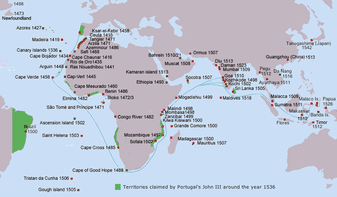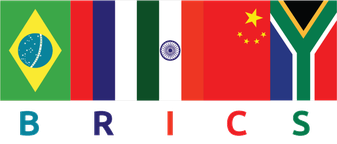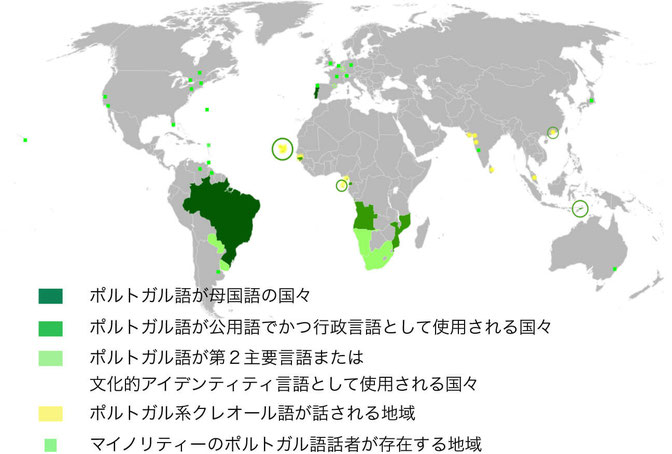ポルトガル語を話す国・外来語・
カーニバル等言語特徴ご紹介|
ポルトガル語・大阪 梅田・福島でスクール
ポルトガル語特徴
世界のポルトガル語
ポルトガル語は、世界で約2億5,000万人、また8番目の母国語・公用語・話者人口を抱える主要言語です。そのうちブラジルが約2億人、全体の80%を占め、残りの5,000万人はアフリカ・アジア諸国と世界の大陸にまたがって話され、その起源であるポルトガルの人口は約1,000万人であり、他とは異なる進化を遂げた珍しいタイプの言語だと言えます。

大きく分けて、主にポルトガルで話される「イベリアポルトガル語」、「アフリカポルトガル語」、「ブラジルポルトガル語」の3つに分類されます。それぞれ発音、単語、用法等が異なった特色を持っています。
ポルトガル、ブラジルの他、アフリカ大陸ではアンゴラ、カーボベルデ、ギニアビサウ、サントメ・プリンシペ、モザンビーク、赤道ギニア、アジアでは東ティモールやマカオで、また欧州連合の公用語です。
同じラテン語を起源とするスペイン語は、ある意味ヨーロッパ語の中での方言のような関係にあり、各語の話者がそれぞれの言葉でそのままコミュニケーションが取れるほど差異が小さく、イタリア語も含めると似て異なる言語として、そのうちの一言語を話すことができれば、他言語も比較的容易く覚えることができます。特にポルトガル国境近く、スペイン北西部のガリシア地方で話されるガリシア語との差異は更に小さく、どちらかというとポルトガル語寄りの言語という趣です。
世界のブラジル/日本との関係
日本では両国の歴史的な関係性や、今日では経済発展が著しいBRICsの一角でもあることから、ブラジルポルトガル語が重要視され、日本全国で20万人以上の日系ブラジル人が地域の身近な外国語として新たな地平を切り開いています。
移民史100周年を超えたブラジルでの日系人の人口比率は約0.8%で、社会的地位が高く、現地では「世界で最も優秀な日本人はブラジルにあり」とまで言われ、ラテンアメリカ諸国最難関であるサンパウロ大学(ブラジルの東大)在籍者の約14%が日系人です。
2014年のワールドカップ、2016年のオリンピックを通過し、日本でも世界的にも学習者数が増加の一途を辿っています。

16世紀にポルトガル人による西洋文明の洗礼を受け、当時伝来したポルトガル語が現在でも日本語として使われています。例えば、カステラ、カッパ、テンプラ、コップ、ボタン等がよく知られていますが、意外と毎朝食べるパン(pão) もポルトガル起源だとはあまり知られていません。もし英語起源の外来語であればブレッド (bread) ですが…。他に面白いところでは、京都市中京区の先斗町という地名もポルトガル語起源と言われています。
歴史と未来

ポルトガル帝国は名実ともに消滅したものの、600年近く続いた植民地支配の名残が世界各地で散見されます。各国の歴史的建造物、宗教の影響、そして何と言っても歌うような響きのあるポルトガル語は、ボサノバ好きのお洒落で先鋭的な人々に愛され、マデイラワインを飲みながらアミーゴとの語らいに、リオのカーニバルでサンバを歌いながらこれからも継承されて行くことでしょう。
ポルトガル語は他のラテン語起源の言語同様、日本人にとって比較的発音し易く、英語学習の基礎があるため全くゼロからの学習ということでなく、単語の語尾の規則的な変型 (例:globalization ⇒ globalização) や、同義の言葉への置換 (good morning ⇒ bom dia) 等により飛躍的に語彙が増えます。
EuroLingualではスタッフもポルトガル語を話しますので、皆様に様々なことを伝授できると思います。是非文化も丸ごと吸収し、未来言語ポルトガル語をマスターしましょう!
ポルトガル語を話す世界の国々
クリックして画像を拡大
多言語スクールの
ポルトガル語
教室で学べる他の言語
レッスンスタイルを選ぶ
Português: Fatos interessantes
Português no Mundo
Considerando a população mundial, o português é a oitava língua mais falada e é língua oficial de cerca de 250 milhões de pessoas. A população brasileira é de aproximadamente 200 milhões de pessoas, ocupando 80% desse total e o outros 50 milhões estão distribuídas na África e países asiáticos. Portugal, país de onde a língua teve sua origem, possui uma população de cerca de 10 milhões de pessoas.

O português faz parte do grupo de línguas Ibero-romanas que se desenvolveu a partir de dialetos derivados do latim, falados no reino da Galiza durante a época medieval. O português é a língua oficial de Portugal (Europa), Brasil (América), Angola, Cabo Verde, Guiné-Bissau, São Tomé e Príncipe, Moçambique, Guiné Equatorial (no continente Africano), Macau e Timor-Leste (Ásia) e também na União Européia. De um modo geral, o português pode ser classificado em três estilos: o "Português Ibérico", falado em Portugal, o "Português Africano" e o "Português Brasileiro". Cada um desses possui características diferentes na sua pronúncia, vocabulário e na maneira que estas são usadas.
Português: Origem e expansão
O português, assim como espanhol, é uma língua de origem latina e poderia ser considerado como um dialeto dentro dos idiomas europeus, pois a diferença entre as duas línguas é pequena. Quem fala português pode comunicar-se diretamente com quem fala espanhol. O italiano também está no mesmo grupo, mas apresenta mais diferenças. Quem fala qualquer uma dessas línguas pode aprender as outras com facilidade. Ainda na Galiza, que se situa perto da fronteira de Portugal (no noroeste da Espanha) fala-se o galego, que tem ainda maior similaridade com português que as outras línguas latinas mencionadas anteriormente.

No século 16, quando a civilização ocidental entrou no Japão, algumas palavras do português foram incorporadas ao vocabulário japonês e são usadas até hoje. Alguns exemplos disso são as palavras castela (pão de ló), capa, tempura, copo, botão, que são bem conhecidas. A palavra “pão” (alimento que é consumido todas as manhãs) também tem origem no português, embora poucos saibam disso. Se a palavra fosse derivada do inglês deveria se chamado de “bread”. A denominação de alguns lugares, como “Ponto-cho”, Kyoto Nakagyo-ku, também está relacionada ao português.
O Império Português foi dissolvido, mas vestígios da dominação colonial, que durou 600 anos, estão espalhados em várias partes do mundo. Isto é observado nos prédios históricos de cada país, na influência da religião e nas músicas. A Bossa Nova é um estilo musical tipicamente brasileiro e é apreciada por diversas pessoas, que gostam de beber um bom vinho e conversar com os amigos ao som desse estilo musical. Ainda há o samba, cantado bastante durante o Carnaval no Rio de Janeiro e São Paulo. A riqueza da língua portuguesa não tem fim!
Português: Sua importância no Japão
Hoje, no Japão, o português do Brasil é uma língua bastante importante, não somente devido às relações históricas entre os dois países, mas também porque o Brasil participa do grupo de desenvolvimento econômico BRICs (Brasil, Russia, India, China e África do Sul). Mais de 200.000 brasileiros, descendentes de japoneses, abriram novos horizontes em cada região do Japão, introduzindo uma nova língua estrangeira ao povo oriental. A história da imigração japonesa no Brasil tem mais de 100 anos e a proporção da população de japoneses em terras brasileiras é de cerca de 0,8%. Atualmente, a situação social destes imigrantes é alta, pois é dito que "Os melhores japoneses estão no Brasil". Cerca de 14% dos estudantes da Universidade de São Paulo (*) são descendentes japoneses.
(*) A maior universidade pública brasileira e a universidade mais importante do país, da Ibero-América e uma das melhores e mais prestigiadas do mundo: Como se fosse Universidade de Tóquio no Brasil.

O Brasil sediou a Copa do Mundo em 2014 e os Jogos Olímpicos de 2016. Com esses motivos, o número de alunos de português está crescendo no mundo inteiro e no Japão também.
O português é fácil de pronunciar para os japoneses, assim como outras línguas de origem latina. Aqueles que apresentam um pouco de conhecimento da língua inglesa tem maior facilidade em aprender português. Por exemplo, as terminações de algumas palavras são modificadas da mesma maneira que algumas palavras no inglês (Ex: globalization⇒ globalização) e algumas palavras tem o mesmo significado (good night⇒ boa noite), etc. Assim, torna-se mais fácil aprender o vocabulário.
Na EuroLingual, os funcionários também falam português, assim podemos ensinar de maneira fácil e rápida a todos aqueles que quiserem iniciar o estudo da língua portuguesa. Vamos a aprender não somente uma língua nova, mas também absorver uma cultura interessante!
Portuguese Language and Culture: Facts
Portuguese in The World
Considering the world's population, Portuguese is the eighth most spoken language and is the official language of about 250 million people. The Brazilian population is approximately 200 million people, occupying 80% of the total and the remaining 50 million are distributed in Africa and Asia. Portugal, a country where the language was originated, has a population of about 10 million people.

The Portuguese is part of the group of Ibero-Romance languages that was developed from Latin-derived dialects spoken in the Kingdom of Galicia during medieval times. Portuguese is the official language of Portugal (Europe), Brazil (America), Angola, Cape Verde, Guinea-Bissau, Sao Tome and Principe, Mozambique, Equatorial Guinea (on the African continent), Macau and East-Timor (Asia) and also in the European Union. In general, the Portuguese can be classified into three styles: the "Iberian Portuguese", spoken in Portugal, "African Portuguese" and the "Brazilian Portuguese". Each of these has different characteristics in their pronunciation, words and the way these are used.
Portuguese: Origin and expansion
The Portuguese, and Spanish is a language of Latin origin and could be considered as a dialect in European languages, as the difference between the two languages is small. Portuguese speakers can communicate directly with Spanish speakers. The Italian is also in the same group, but has more differences. People that speaks any of these languages can learn the any other easily. Even in Galicia, which is located near the border of Portugal (in northwestern Spain) Galician is spoken, which has even more similarity to Portuguese than other Latin languages mentioned above.

In the 16th century, when Western civilization entered Japan, a few words of Portuguese were incorporated into the Japanese vocabulary and are used today. Some examples of this are the words castela (sponge cake), capa, tempura, copo, botão, which are well known. The word "pão" (food that is consumed every morning) also originates from the Portuguese, although few know it. If the word was derived from the English should be called "bread". The name of some places as "Ponto-cho," Kyoto Nakagyo-ku, is also related to Portuguese. The Portuguese Empire was dissolved, but vestiges of colonial domination, which lasted 600 years, are scattered in various parts of the world. This is seen in the historical buildings of each country, the influence of religion and the songs. Bossa Nova is a typical Brazilian musical style and is enjoyed by many people, who like to drink good wine and chat with friends at the sound of this musical style. There are samba, sung enough during Carnival in Rio de Janeiro and Sao Paulo. The richness of the Portuguese language has no end!
Portuguese: Its Importance in Japan
Today, in Japan, the Portuguese of Brazil is a very important language, not only because of the historical relations between the two countries, but also because Brazil participates in the economic development group BRICs (Brazil, Russia, India, China and South Africa ). More than 200,000 Brazilians of Japanese origen, opened new horizons in each region of Japan, introducing a new foreign language to the eastern people. The history of Japanese immigration to Brazil has more than 100 years and the proportion of the population of Japanese in Brazilian territory it is about 0.8%. Currently, the social situation of these immigrants is high, it is said that "the best Japanese are in Brazil". About 14% of the students at the University of Sao Paulo (*) are Japanese descendants.
* The largest Brazilian public university and the most important university in the country and in Latin America and one of the best and most prestigious in the world: As if it is Tokyo University in Brazil.

Brazil hosted the World Cup in 2014 and the Olympic Games in 2016. For these reasons, the number of students of Portuguese is growing worldwide and in Japan as well.
Portuguese is easy to pronounce for Japanese, as other languages of Latin origin. Those who have some language knowledge of English will find easier to learn Portuguese. For example, the endings of some words are modified in the same way that some words in English (e.g. globalization ⇒ globalização) and some words have the same meaning (good morning ⇒ bom dia), etc. Thus, it becomes easier to learn vocabulary.
In EuroLingual, employees also speak Portuguese, so we can teach quickly and easily to all those who want to start the study of the Portuguese language. We learn not only a new language but also an interesting culture!
多言語スクールの
ポルトガル語
教室で学べる他の言語




























